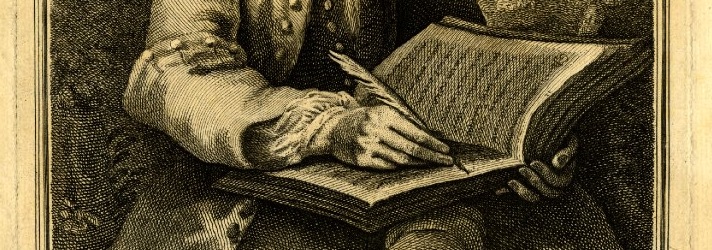HENRY NORRIS
“Friendship”
Addressed to Mr. J. C. WESTCOTT, of Exeter College, Oxon.
Solem enim e mundo tollere videntur, qui Amicitiam e
vita tollunt; qua a diis immortalibus nihil melius ha-
bemus, nihil jucundius.
Cic[ero].
Whether reclin’d on Charwell’s flow’ry side,
Or where fair Isis rolls her watry pride;
Arise, my PYLADES; to thee I sing,
To thee and Friendship wake the slumb’ring string.
Cement of souls, celestial child of JOVE, 5
Pure emanation of immortal love,
Great Friendship, come; enlarge my op’ning mind,
Refine my soul with love of good and kind,
Nor leave one sordid grain of self behind.
So let me taste thy joys, uncumber’d, free, 10
And future heav’n anticipate in thee.
What, without thee, were life, were glory, fame?
A morning shadow, and an empty name.
The black’ning horrors of tempestuous fate,
‘Tis thine to brighten, thine to dissipate: 15
Whate’er of bliss we know, ’tis thine to give,
And without thee to live, were not to live.
When Heav’n first rais’d the great creative plan,
And into being spake the fav’rite, man;
Around he saw celestial blessings show’r, 20
Proud of his world, his essence, and his pow’r;
But, in his breast, still felt a painful void
Of something yet unknown, yet unenjoy’d.
JOVE view’d his work; the great design to mend,
He gave him bliss, and call’d that bliss a friend. 25
“Friendship, arise;” thus spake the eternal Sire;
“With glowing sentiment the breast inspire.
Go, soften sorrow, blunt the stings of care,
And teach mankind the ills of life to bear.
The task, how glorious! to dilate the soul, 30
And breathe soft sympathy throughout the whole;
To give the mind to taste of joys divine;
From baser dregs ideas to refine;
The task, how glorious! my son, be thine.”
All nature felt the gift; new joys to prove, 35
Kind mix’d with kind, and waken’d into love:
All seek their friend, in sweet communion join,
And mingle souls, with ecstasy divine.
’Tis Heav’n has fix’d, soft feelings to suggest,
This sympathetic load-stone in the breast. 40
Thus souls their kindred souls magnetic draw,
And all maintain this universal law:
That still, whatever nature steers the mind,
Like to her sister like will be inclin’d.
Virtue with pleasure views, impress’d on youth, 45
The lively semblance of her native truth:
While Vice, with grin of joy, exults to see
The growing marks of shame and infamy.
Hence, e’en the vicious catch the friendly flame;
(If Friendship knows with them that sacred name;) 50
Indulge the blaze, ‘midst riotry and noise,
And feast with rapture, on adult’rate joys;
Tho’ vitiated sense the gust destroys.
Congenial souls with equal passions move,
The same their hatred, the same their love: 55
By force of sympathy, they cool, or burn,
And smile for smile, or sigh for sigh return:
Lords of each others heart, supreme they reign,
Taste all their bliss, or die beneath their pain.
See, in their breasts enthron’d, one common mind, 60
Tho’ Heav’n distinct apartments has assign’d:
Tho’, fetter’d, each endures his sep’rate frame,
Yet is their soul, their ev’ry will the same.
Thus clog’d, their spirits fain would wing their flight,
Pant to get free, and, what they can, unite. 65
But though their bodies fate forbids to join,
Tho’ walls of flesh the fever’d soul confine;
Yet still their streams of life united run,
One, in their will, and in their friendship, one.
Should distant realms their mutual hopes divide, 70
From the Thames’ fair banks, to Ganges’ fertile tide;
Still would the soul, impatient to embrace,
Scornful o’er-shoot the narrow pale of space;
On wings ideal, from her prison start,
And fly to meet her correspondent part. 75
So two fair lucid streams their courses bend,
In fond embrace their wedded waves to blend;
With fervid haste the silver surges roll,
To join in love, and form one friendly whole.
When works the soul, with joy’s glad burthen press’d, 80
When pants, with strangling care, the heaving breast;
How sweet to give the struggling load relief,
To share our hoarded joys, our treasur’d grief;
Unlock the secret casket of the heart,
And ev’ry pleasure, ev’ry pain impart! 85
How sweet to hang on Friendship’s tuneful tongue,
To drink, with thirsty ear, the love-fraught song!
Catch the young accents, as they swell to birth,
Heralds of grief, or harbingers of mirth!
To mingle tear with tear, meet smile with smile, 90
Enhance the bliss, or sorrow thus beguile!
These are thy joys, O Friendship, joys that spring
Beneath thy eye, and claim they parent wing.
Joys, great as these, may lavish fate decree,
To bless profuse my PYLADES and me. 95
Nor wealth I beg, no ermin’d pomp implore;
Grant but my friend, and, Heav’n, I’ll ask no more.
NOTES:
Subtitle Mr. J. C. Westcott Unable to trace; Oxon. An abbreviation for Oxford University.
Epigraph Cicero Marcus Tullius Cicero (106 BCE-43 BCE), Roman statesman, lawyer, and writer, known for his oratory and rhetorical skills. “They might as well steal the sun from the heavens as remove friendship from life! For nothing we have from the gods is better or more enjoyable than friendship.” From Laelius de Amicitia, a treatise on friendship published in 44 BCE.
1 Charwell Northernmost tributary of the River Thames (Britannica).
2 Isis Alternative name for the River Thames (Britannica).
3 PYLADES Cousin and closest friend of Orestes, a hero of ancient Greek mythology (Britannica).
5 JOVE Jupiter, the king of the Roman gods.
71 Thames River in southern England that flows through London; Ganges River in India and Bangladesh.
96 ermin’d Clothed with fur of the ermine; a species of weasel whose pelt was used historically in royal robes in Europe (OED).
SOURCE: Poems on Various Subjects (Taunton, 1774), pp. 18-24. [Google Books]
Edited by Aydin Jang

